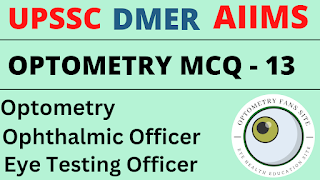Ophthalmic Officer, Eye Testing Officer and Optometrist important multiple choice questions series for DHS Exam, DMER exam, AIIMS exam, UPSSSC exam, to preparation.
Ophthalmology and Optometry MCQ Series Part 13
1. Ulcer serpens is caused by:
a. Pseudomonas
b. Pneumococcus
c. Gonococcus
d. Diphtheria
2. Which of the following can cause corneal perforation in just 48 hours ?
a. Staphylococcus
b. Pseudomonas
c. Diphtheria
d. Aspergillus
3. Which of the following is not a feature of fungal corneal ulcer?
a. Fixed hypopyon
b. Ulcer with sloughing margins
c. Symptoms are more pronounced than signs
d. Fungal hyphae are seen on KOH mount
4. Satellite nodule with corneal ulcer is seen in:
a. Fungal ulcer
b. Viral keratitis
c. Bacterial ulcer
d. Acanthamoeba keratitis
5. Which of the following is the drug of chojce for fungal corneal ulcers caused by filamentous fungi?
A. Itraconazole
B. Natarnycine
C. Nystatine
D. Fluconazole
6. Which of the following is used In th treatment of fungal keratomycosis ?
A. Silver sulfadiazine
b. Linezolid
c. Vancomycin
d. Doxycycline
7. Which of the following is the most important adjuvant therapy for fungal corneal ulcer ?
a. Atropine sulphate
b. Dexamethasone
c. Pilocarpine
d. Lignocaine
8. Steroids are contraindicated in:
a. Phlyctenular conjunctivitis
b. Mooren's ulcer
c. Vernal keratoconjunctivitis
d. Dendritic ulcer
9. Corneal sensations are decreased in:
a. Herpes simplex
b: Fungal infection
c. Trachoma
d. Mooren' s ulcer
10. Which of the following is an important feature of herpes simplex keratitis?
a. Circumciliary congestion
b. Corneal infiltrate
c. Pannus
d. Decrease in corneal sensation
11. Recurrent corneal erosions are seen in:
a. Keratoglobus
b. Keratoconus
c. Glaucoma
d. Corneal dystrophy
12. In Keratoconus, all are seen except:
a. Munson's sign
b. Thinning of cornea at the center
c. Distortion of the corneal reflex
d. Hypermetropic refractive error
13. True about Keratoconus are:
a. Increased curvature of the cornea
b. Astigmatism is seen
c. Kayser-Fleischer ring is seen
d. Cornea is thick
e. Soft contact lenses are used
14. Acute hydrops is seen in:
a. Keratoglobus
b. Bullous keratopathy
c. Keratoconus
d. Buphthalmos
15. Fleischer's ring is seen in:
a. Pterygium
b. Chalcosis
c. Keratoconus
d. Trauma
16. Early Keratoconus may be diagnosed by:
a. Corneal topography
b. Keratometry
c. Pachymetry
d. Ophthalmoscopy
17. Enlarged corneal nerves may be seen in all of the following except:
a. Keratoconus
b. Herpes simplex keratitis
c. Leprosy
d. Neurofibromatosis
18. Band shaped keratopathy is due to the deposition of:
a. Calcium
b. Amyloid
c. Iron
d. Melanin
19. Band shaped keratopathy is treated by:
a. Propamidine isethionate
b. EDTA
c. Polyhexamethylene biguanide
d. Chlorhexidine
20. Corneal dystrophies are:
a. Primarily unilateral
b. Primarily bilateral
c. Primarily unilateral with systemic disease
d. Primarily bilateral with systemic disease
21. Which of the following is the least common corneal dystrophy?
a. Macular dystrophy
b. Lattice type I dystrophy
c. Lattice type II dystrophy
d. Granular dystrophy
22. Which of the following stains is used in Granular dystrophy of cornea?
a. Masson's trichrome
b. Congo-red
c. Colloidal iron
d. PAS
23. Pigment deposition on cornea is seen in toxicity of:
a. Chloroquine
b. Digoxin
c. Amiodarone
d. Ranitidine
e. Diclofenac
24. Which of the following does not result in amorphous whorl like deposits in the cornea?
a. Chloroquine
b. Amiodarone
c. Indomethacin
d. Chlorpromazine
25. Dellen is:
a. Localized thinning of peripheral cornea
b. Raised lesion at the limbus c. Marginal keratitis
d. Age related corneal degeneration
Get Answer key 🔐 Require premium account
Or
Watch videos to Answer key 🗝️
Download Optometry MCQ Series - 11 PDF with Answer key Click below 👇 🔗

